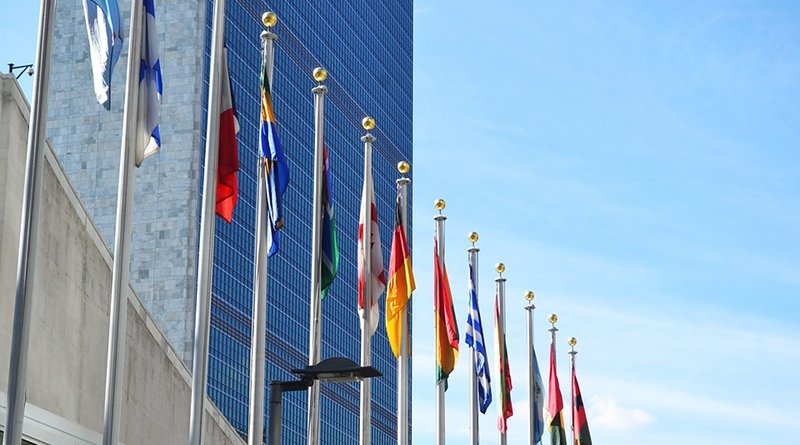How Useful Is The UN When It Comes To Pandemic Policy? – Analysis
It is a bit early to tell how far the UN General Assembly will go as far as its pandemic actions are concerned, but the crux of the matter is the UN’s usefulness when it comes to issues, such as COVID-19 policy, that affect all countries alike. Also, beyond the words delivered by global leaders at the Security Council, there are issues of how the UN is performing via its various humanitarian aid bodies.
In March 2020, UN Secretary-General Antonio Guterres described the coronavirus outbreak as the “greatest test” since the Second World War, adding that “it is more than a health crisis, it is a human crisis.” This emphasis on “human” by the UN leader is important because of the nature of the threat to the organization’s sustainability development goals and other pre-pandemic planning efforts to improve “the human condition.” Now, the UN needs to scrap, and later rebuild, planning efforts while the gears of the UN aid network sees to it that the current COVID-19 policy is put into practice.
When Guterres released the UN’s plan to counter the pandemic, the document emphasized the need for countries to act in concert, and outlined ways to suppress transmission of the virus, safeguard people’s lives and livelihoods, and learn from the crisis to build back. This approach, despite valiant efforts, is not universally applied in every country and, thus, the UN approach to act “in concert” is still scattered in various ways, including vaccine diplomacy and market share as well as distribution networks.
The UN also emphasized the “human” crisis perhaps needed to take into consideration how resistance to vaccine mandates and lockdowns would impede human rationality. The UN needs to take into consideration at a higher level of policy analysis the psychological damage from this multi-year pandemic event.
The UNGA passed two resolutions to address the-then new COVID-19 global crisis. On April 2, 2020, “Global solidarity to fight the coronavirus disease 2019” was really about unifying a global purpose. This resolution called for international cooperation and multilateralism by emphasizing synchronization. The UN’s ability to synchronize well even in the best of times is subject to various forces on the ground that can interfere in objectives.
Two weeks later, a second resolution, “International cooperation to ensure global access to medicines, vaccines and medical equipment to face COVID-19,” urged international cooperation to ensure equitable global access to medical equipment, treatment and vaccines. We all know how that effort panned out, with multiple vaccines and multiple delivery systems support.
In addition, the document emphasized the need for human rights to be respected during the pandemic. That aspect is now part of a brutal rhetorical and physical battle occurring in societies around the world. This illustrates that the UN wish goes only so far on the issues of human rights until the wall of reality during a global pandemic appears. Clearly, conflict, climate extremes and economic shocks all remain primary drivers of acute food insecurity that is hindering pathogen eradication.
In June 2020, the “UN Comprehensive Response to COVID-19” was launched “to save lives, protect societies, recover better” by stepping up the UN aid system. This policy document appeared six to seven months after the outbreak when it was clear that a crisis was imminent with the first initial pathogen wave. The time gap was costly and illustrates how the UN needs to prepare policy contingencies of an extreme nature with updating on a constant basis.
The pathogen’s perseverance through every community, by passing some and infecting others, is the “human cost and burden.” The UN cannot fix this aspect since the remedy comes from the community. Assessing how to repair broken societies during and after the pandemic should be a primary UN goal.
The UN is relying heavily on the Food and Agriculture Organization, the International Fund for Agricultural Development, International Labor Organization and the World Health Organization to help the most vulnerable during the pandemic. The work of these organizations, while notable, is wrapped up in politics and perhaps even ineffective.
The WHO is the most notorious for some observers, and the most criticized for inefficiency and favoritism. As the world faces the third and fourth waves of the pandemic, the UN system tied into these agencies is perhaps illustrative of a setup in desperate need of reform. This reform needs to come later given current UN operations in pandemic response.
To be fair, the Security Council is releasing reports on the socioeconomic impacts of COVID-19. One is a call to action for the immediate health response required to suppress transmission of the virus to end the pandemic, and to focus on people — women, youth, low-wage workers, small and medium enterprises, the informal sector and on vulnerable groups — already at risk. Noble, but is it enforceable? That is up to individual country governments.
Overall, enhanced international support for countries with limited abilities can be helped by UN agencies, but individual countries really need to stand up and governments must bend to the demands of their communities. UN policymakers need to see the world in a whole new light, which may be one of the benefits of the pandemic itself — long-term human security.

